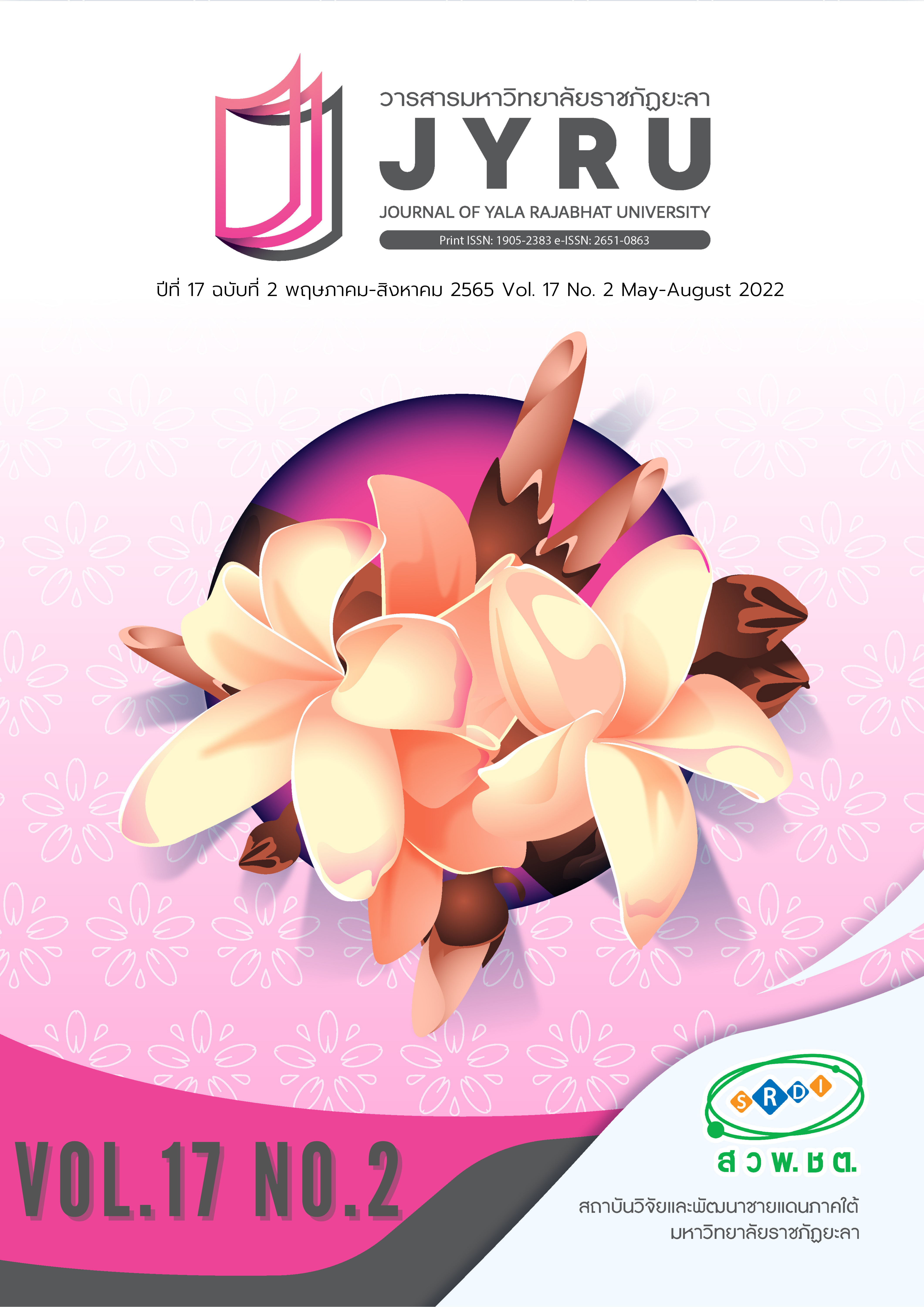สภาพและแนวทางการจัดการเรียนรู้โดยใช้กีฬาเป็นฐานสำหรับเยาวชนในพื้นที่จังหวัดชายแดนภาคใต้
Main Article Content
บทคัดย่อ
การจัดการศึกษาเพื่อพัฒนาเยาวชนในพื้นที่จังหวัดชายแดนภาคใต้ของไทยยังคงมีความจำเป็นต่อการพัฒนาคุณภาพการศึกษาและเสริมสร้างความมั่นคงในพื้นที่ จึงได้ทำการวิจัยเพื่อวิเคราะห์สภาพการจัดการเรียนรู้และเสนอแนวทางการจัดการเรียนรู้โดยใช้กีฬาเป็นฐานสำหรับเยาวชนในพื้นที่จังหวัดชายแดนภาคใต้ด้วยวิธีวิจัยเชิงคุณภาพ เก็บรวบรวมข้อมูลโดยการศึกษาเอกสาร การสนทนากลุ่มกับผู้ให้ข้อมูล จำนวน 15 คน และการสังเกต ตรวจสอบข้อมูลโดยใช้วิธีการตรวจสอบข้อมูลแบบสามเส้า และวิเคราะห์ข้อมูลโดยใช้วิธีการวิเคราะห์เชิงเนื้อหา พบว่า สภาพการจัดการเรียนรู้ สามารถแบ่งได้ 6 ด้าน ได้แก่ ด้านนโยบายและเป้าหมาย ด้านกระบวนการบริหาร ด้านการจัดการเรียนการสอน ด้านการอบรมและพัฒนาบุคลากร ด้านงบประมาณ และด้านผลกระทบต่อโครงการ ซึ่งสภาพการจัดการเรียนรู้ทั้ง 6 ด้าน นำมาสังเคราะห์เป็นกลยุทธ์การจัดการเรียนรู้ 4 กลยุทธ์ คือ กลยุทธ์เชิงรุก กลยุทธ์ในการป้องกัน กลยุทธ์ในการแก้ไข และกลยุทธ์เชิงรับ อันนำมาสู่ข้อเสนอแนวทางการจัดการเรียนรู้ 5 ระดับ ได้แก่ ระดับรัฐบาล ระดับกระทรวง/จังหวัด ระดับสถานศึกษา ระดับสถาบันอุดมศึกษา และระดับชุมชน/เครือข่าย ข้อค้นพบในครั้งนี้ชี้ให้เห็นว่า การกีฬาสามารถเป็นอีกทางเลือกสำหรับบูรณาการการจัดการเรียนรู้เพื่อสร้างแรงจูงใจให้กับเยาวชนและพัฒนาคุณภาพการศึกษาไทยต่อไป
Article Details

อนุญาตภายใต้เงื่อนไข Creative Commons Attribution-NonCommercial-NoDerivatives 4.0 International License.
บทความ ข้อมูล เนื้อหา รูปภาพ ฯลฯ ที่ได้รับการเผยแพร่ในวารสารมหาวิทยาลัยราชภัฏยะลานี้ ถือเป็นลิขสิทธิ์ของวารสารมหาวิทยาลัยราชภัฏยะลา หากบุคคลหรือหน่วยงานใดต้องการนำทั้งหมดหรือส่วนหนึ่งส่วนใดไปเผยแพร่ต่อหรือกระทำการใดๆ จะต้องได้รับอนุญาตเป็นลายลักษณ์อักษรจากวารสารมหาวิทยาลัยราชภัฏยะลาก่อนเท่านั้น
เอกสารอ้างอิง
Anumarnrajathon, M. (2006). Public policy. Bangkok: Expernet. (in Thai)
Coakley, J. (2011). Youth sports: what counts as “positive development”. Journal of Sport and Social Issues, 35(3), 306-324.
Luecke, R. & Bartlett, C. (2018). Manager’s toolkit (Sintrakarnpol, N,interpret).Bangkok: Expernet. (in Thai)
Manokarn, M. (2018). Basic education reform and spatial education management. Journal of EducationScience, 19(1), 1-15. (in Thai)
Ministry of Education. (2018). Report on the performance of the government policy for the 4th year (12 September 2017 – 31 July 2018)[online]. Retrieved June 24, 2018, from: https://www.moe.go.th/moe/upload/news_policyPRAYUT/FileUpload/52481-6903.pdf. (in Thai)
Ministry of Tourism and Sports. (2017). National sports development plan no. 6 (2017 – 2021). Bangkok: The War Veterans Organization's printing. (in Thai)
Public Relations Office Region 6. (2018). Voice of "southern border teachers" teachers in the 3 southern border provinces look at the quality of education in the area better[online]. Retrieved June 24, 2018, from: https://region6.prd.go.th/ewt_news.phpnid=13910&filename=index&nid=13910&filename=index. (in Thai)
Rerkkam, S. (2020). The provision of human resources in the chaning era. Bangkok: Chulalongkorn University Press. (in Thai)
Roikrong, B. (2010). Development of educational guidelines in multicultural societies. Doctoral dissertation. Chulalongkorn University. (in Thai)
Suwanmanee, S. (2013). Public secondary schools administration model relevant to the multicultural social context: a case study of the three southernmost provinces. Doctoral dissertation. Thaksin University. (in Thai)
Tongkow, K. (2015). Area-based education management: concept, guidelines and case study. Suratthani Rajabhat Journal Suratthani Rajabhat University, 2(2), 23 – 40. (in Thai)


